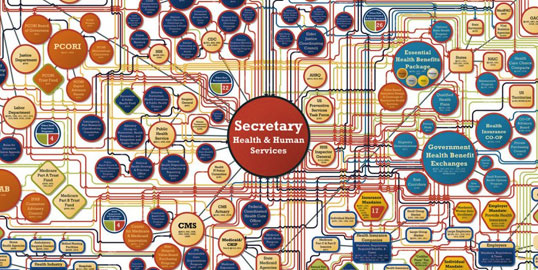Governor Should Tread Slowly on Health Care Exchanges
(see the ProJo OpEd version here)
The Governor’s office should exercise caution and search for answers to important questions before rubber-stamping the health insurance exchange ‘executive order’ recommended by a special panel. President Obama’s controversial Patient Protection and Affordable Care Act (PPACA) “Exchanges” may simply be too risky for RI.
We encourage a serious public debate on this very important issue before bypassing the normal legislative process, which failed to pass related legislation. The debate should focus on whether or not now is the appropriate time to move forward with a PPACA exchange, especially considering the high associated risks and potential alternative paths. Our state has time, and should take the time to act prudently.
The PPACA federal law is unstable, politically and legally. In August, the 11th Circuit Court of Appeals ruled that PPACA exchanges, which would create an individual mandate to purchase health insurance, is unconstitutional. Also, one implication of the recent national debt-ceiling debate may mean that millions or even billions of dollars designated to support PPACA would be at risk if the debt super-committee can’t come up with the required spending cuts.
There are many arguments and questions about why RI should not rush into implementing this controversial system at this time:
- Federal policy is in a precarious state of flux: The President announced that he favored significant changes to his health care reform, providing even more uncertainty about future changes from Washington. PPACA is also under attack by Congress, with open threats to deny funding or repeal it. There is concern that if RI implements a PPACA exchange that the federal government, would not be able to provide the federal funds that we may anticipate. What happens if PPACA is ruled unconstitutional and we create an exchange, does RI have to assume these cost commitments?
- Federal health care legislation may be unconstitutional: PPACA has been ruled unconstitutional by federal courts in Florida and Virginia as well as by the 11th Circuit. This legal uncertainty underscores the danger of RI risking the time, expense, and potential that PPACA could be thrown out as unconstitutional. The US Supreme Court is expected to hear and rule on this case by June of 2012. Also, if a new administration were to be elected later in 2012, it is certain that it would spell doom for PPACA. Recent polls suggest that a 2nd Obama term is anything but guaranteed. Is it sound public policy to push ahead with the Exchange when we don’t know if we can legally require everyone to participate?
- Impact on businesses. Have we evaluated how businesses will react? I have spoken with many business owners who believe that PPACA will increase premium costs to the point where it may be more prudent for them to dump health coverage for their employees and pay the federal fine. How would this make RI a more competitive state for business?
- Federal Strings. RI is again chasing federal funds, which bring along a multitude of federal mandates, which, in turn, are highly likely to change … unpredictably so. Just recently PPACA was changed to mandate that all “exchange” insurance policies must now cover birth control contraceptives. And, as recently as April 5, 2011 Congress passed changes that rewrote the way health exchange subsidies will be paid for. Already, the law’s foundation is crumbling among other states: in August, Kansas returned a large federal grant wanting out of the law and its mandates. Why should we race to put RI in the same position?
- Our state cannot afford to waste time and money on this risky endeavor. With all of the problems our state confronts and the multitude of other reforms we must enact; and when PPACA federal funding may never be provided, and while there is so much legal uncertainty why should we risk wasting critical resources on this issue?
- Government vs Free Market: the very idea of a government controlled exchange is antithetical to our nation’s historical free-market principles, which is the only proven way to consistently deliver a quality service at the lowest possible rate. A true free-market “is” an exchange in itself! Do we even know if RI’s small risk pool can effectively support an exchange? State’s rights issues also come into play.
Since states are not required to implement an exchange until 2014, why shouldn’t we hold off making these decisions until after the uncertainty around PPACA has played itself out? Dozens of other states have held off.
We all want lower prices for good health insurance. Instead of conforming to a federally controlled system, Rhode Island should consider regional Health Insurance Compacts and expanded Health Savings Accounts, which would allow free-market competition to reduce prices and to provide consumers with more choices. Such compacts would authorize out-of-state insurers to compete for business, in much the same way that we purchase auto and property insurance. These free-market models would create larger markets, more competition, more choices, and lower prices.
Right now, PPACA is a major headache for the Obama administration. Why should we make it Rhode Island’s headache as well?
Mike Stenhouse is CEO of the RI Center for Freedom and Prosperity.


Leave a Reply
Want to join the discussion?Feel free to contribute!